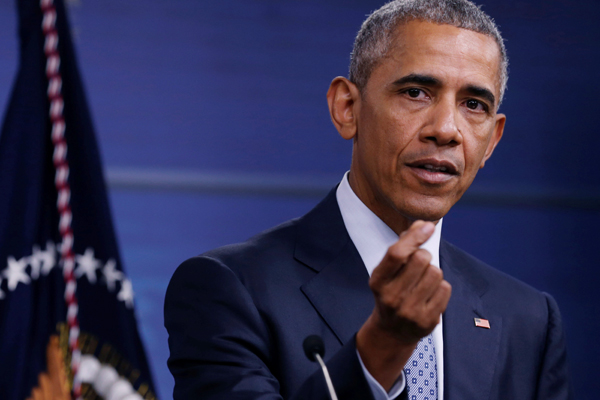Obama has job cut out to leave behind legacy
- By Shen Dingli
 0 Comment(s)
0 Comment(s) Print
Print E-mail China Daily, September 7, 2016
E-mail China Daily, September 7, 2016
|
|
|
File photo shows US President Barack Obama holds a news conference at the Pentagon in Arlington, Virginia, US, August 4, 2016. [Photo/Agencies] |
US President Barack Obama is going to leave the White House and quite a few legacies, such as the Paris Climate Agreement, nuclear deal with Iran, and the reconciliation with Cuba, in four months. But he will also leave as many controversies behind.
In the United States, for instance, Obama's unprecedented legislation on healthcare has advanced the agenda of progressiveness, but it has also divided the US on partisan lines. Externally, his willingness to "reset" US relations with Russia has resulted in a treaty to further reduce nuclear weapons, but relations between Washington and Moscow have worsened due to Crimea crisis.
The same applies to the Obama administration's relations with China. Despite his initial earnestness to usher in a strategic dialogue with China, he has ended up weaving a network to counter China. Obama's rebalancing strategy to deploy some 60 percent of the US navy and air force overseas in the Asia-Pacific region is aimed at checking China's rise. And his Trans-Pacific Partnership agreement is designed to boost US competitiveness in exports and investments, at China's cost.
Nevertheless, the legacy of Obama's rebalancing strategy will not last long. Whether Republican Donald Trump or Democrat Hillary Clinton succeeds him, Obama's TPP is unlikely to be inherited in its current form by the next US administration. Trump, if elected US president, is more likely to put aside TPP.
In this sense, Obama's Asia tour, with visits to Hangzhou for the G20 Summit and Vientiane for the East Asia Summit, could be the beginning of the end of his rebalancing to Asia-Pacific strategy. Neither Obama's TPP and Transatlantic Trade and Investment Partnership plans are likely to yield results-even if Clinton succeeds him-nor is the US military pressure expected to produce the results Obama expects.
Obama should have realized that as the second-largest economy, China is not a country that can be coerced into accepting unfair economic and political conditions.
Obama's policy toward China, like his other policies, too, has yielded mixed results. But despite mutual frustration over hacking, and maritime security and human rights issues, the list of Sino-US cooperation is long.
China and the US succeeded in converting their tense relations, as seen at the 2009 Copenhagen climate conference, into a cordial partnership that led to the signing of the Paris Climate Agreement. The meeting between President Xi Jinping and Obama on the sidelines of the G20 Summit was another example of the two countries' fruitful cooperation.
China-US cooperation to promote nuclear nonproliferation is another major success. Beijing and Washington worked together to advance the P5+1 negotiation with Iran to reduce nuclear threat and conclude the Joint Comprehensive Plan of Action in July 2015.
But the Korean Peninsula issue continues to pose a challenge to the regional peace, with the Democratic People's Republic of Korea intensifying its nuclear program and the US' deployment of the Terminal High Altitude Area Defense system in the Republic of Korea has made matters worse. So, in conjunction with China, Obama has to adequately address each of these issues as well as to decouple them. Otherwise, growing distrust will undermine their concerted efforts to bring stability to the peninsula and consolidate the non-proliferation regime.
The South China Sea issue is not a part of the G20 Summit, but still it's important for China and the US to agree to respect each other's sovereign rights and maritime interests. For example, the US should stop taking sides in the South China Sea disputes, and China should respect US interests in international air space and sea. So it will be a welcome change to see Obama employing an approach at what could possibly be his last official meeting with China's top leaders that shows reconciling interests isn't necessarily mission impossible.
The author is a professor at and associate dean of the Institute of International Studies, Fudan University.






